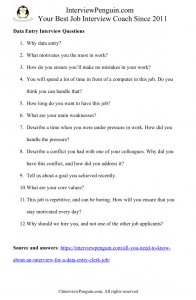Though you won’t have to deal with extreme challenges in your job, and will work mostly alone, you still won’t be an isolated unit in the company. You will interact with your colleagues, and sometimes also with the patrons you’ll call to, while trying to collect some data that you will enter later to the computer.
Bearing this in mind, the hiring managers will ask you a few personal and behavioral questions. They do it to understand your motivation, communication skills, as well as your attitude to work, people, and to life in general. Let’s have a look at some of the questions, and also practical test you may face in this interview.
Table of Contents
Why data entry?
This job isn’t special in any means, and it makes no sense to try to convince the hiring managers that you have always dreamed of becoming a data entry clerk :). But it is a decent job, it doesn’t pay badly, and if you happen to type fast, and enjoy working at a computer, it can be a good choice for you–at least in certain stage of your professional career.
And this is exactly what you should focus on in your answer. Say that you enjoy typing, that you are looking for a job that is relatively easy, and believe to have the skills and abilities to become a good data entry clerk.
What motivates you the most in work?
This question is easy in many other interviews (think teaching, nursing, marketing, etc), but it can make your head spin, when you apply for a data entry job. It is hard to make some impact, to change the world having this position. It is even difficult to see any meaningful purpose in this job.
Therefore you should either refer to simple things, such as a good collective of people, or sense of responsibility (you always give your 100%, doesn’t matter if we speak about job or any other aspect of life).
Another option is being honest, and saying that money motivates you the most. But you should refer to some worthy goal when talking about money, such as providing for your family, or paying for your studies. At the end of the day we all have to pay our bills, and we need a job to do so.
Special Tip: What you wear is also important. Check our Interview attire tips, and impress the interviewers with your outfit.
How do you ensure you’ll make no mistakes in your work?
Everyone makes mistakes. The difference between an average and an excellent employee is that the latter cares, trying their best to minimize the number of mistakes which they make in work.
Tell the interviewers that you will always concentrate on your job (and won’t check your phone every five minutes), and believe that once you gain some experience, you will eliminate almost all mistakes from your work. * They may also test how prone you are to making mistakes, letting you do the typing test. More on it later in the article.
You will spend a lot of time in front of a computer in this job. Do you think you can handle that?
Ensure the interviewers that you are used to spend hours in front of a computer screen, or any other screen. Since an average American spends more than 4 hours a day on their phone, and even more time watching TV, we should have no problem sitting in front of a computer, entering data.
You can even elaborate on your answer, staying that you had a similar job before, and that you can maintain a high level of concentration for a long period of time–at least your previous experience suggests so.
How long do you want to have this job?
Job hopping is a big problem in this business. Once we were in the midst of an economic crisis, it was easy to find new data entry clerks–because many people looked for jobs, and they were ready to accept basically anything.
Times have changed, however (and no doubt they will change again, when another economic crisis arises). Now employers have to fight for job candidates, and when they hire someone, they want them to stay for a long time.
And this is exactly what you should say in an interview. You do not necessarily have to lie, saying that you plan to do data entry for ten years. You can simply say that you are not thinking about any change in the near future, and will see what the next years will bring.
Needless to say, you do not need to stick to your promises later on. You can leave the company in three months, as soon a as better offer rings your mailbox. But once you interview for a job, you should say the things which the interviewers want to hear from you.
Some other questions you may get in your data entry interview
- What are your main weaknesses?
- Describe a time when you were under pressure in work. How did you handle the pressure?
- Describe a conflict you had with one of your colleagues. Why did you have this conflict, and how did you address it?
- Tell us about a goal you achieved recently.
- How do you define success?
- What are your core values?
- This job is repetitive, and can be boring. How will you ensure that you stay motivated every day?
- Why should we hire you, and not one of the other job applicants?
Special Tip: You can download the full list of questions in a simple, one page long PDF, and practice your interview answers anytime later:

The test tells a lot about your readiness for the job
In most cases you will face a series of practical tests in your interview. They will ask you to sit in front of a computer (sometimes you can bring your own laptop, but most of the time you will work with their computers). This typically includes alphanumeric tests, entry numerical (10-key) tests, audio data entry tests, and more…
And while you will face some questions in your interview for a data entry job (we looked at them already in this article), the practical test is typically the decisive part of the hiring process. And it makes a perfect sense.
Hiring managers can observe a lot of things while you are sweating, trying to complete the test in time. Namely:
- How fast you can type (this is the most important thing for them),
- If you look calm and composed while working on your tasks (or nervous and messy),
- How many mistakes you make, etc.
A test is also a great way of comparing job candidates in real time: everyone is assigned the same task, the same set of data, doing the same tests. They can easily see who will type with great precision, who will get the best scores at the end.
Just like with everything else in life, practice makes perfect. If you aren’t sure about your typing skills, and really want the job, I suggest you to have a look at great data entry test preparation package from JobTestPrep. It includes:
- 5 data entry alphanumeric tests,
- 5 data entry numerical (10-key) tests,
- 2 data entry ID tests, A data entry form test,
- 3 data entry cross referencing tests,
- 4 audio data entry tests
Practicing with the interface for a few hours, doing the same tests you will do in your interview, you will quickly improve your scores and get ready to pass the tests. Check the preparation package here.
Conclusion and next steps
You won’t have to answer many difficult behavioral questions or technical questions, and you won’t face a tough competition of twenty other job seekers, as it will be the case with many other entry level jobs (bank teller, marketing trainee, and similar positions).
People do not necessarily fight for data entry jobs, at least not when we experience economic expansion. You won’t compete with dozens other job seekers for this position, but you won’t have a free ride either…
You still have to demonstrate strong motivation, and your readiness for the job. Practice your typewriting skills, and prepare for the questions and tests you may face. That’s the only guaranteed way to succeed… You can also check the articles below, to ensure you’ll do everything right in your interview:
- How to answer interview questions – It is not only about what you say, but also how you say it in an interview. An interesting insight on the topic of non-verbal communication, and how ti can win you a job contract.
- Salary negotiation tips – Let us show you how to negotiate the best possible salary in your next interview.
- Get a job with no experience – If you have no previous working experience, you can still land a decent job. You just have to know how to turn your disadvantage (lack of experience) to an advantage in an interview. This article will show you how.

